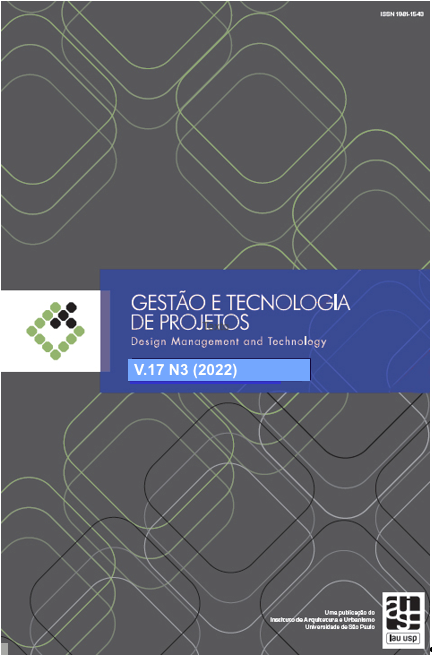Limits and possibilities regarding the use of problem-based learning in undergraduate theses in the architecture and urbanism field
DOI:
https://doi.org/10.11606/gtp.v17i3.187887Keywords:
Active Education Methodology, PBL, National Curriculum Guidelines (DCN)Abstract
Focusing on the student’s figure as responsible for their education process, the active education methodology has been implemented as an alternative to traditional methods that assign this responsibility to teachers. This paper investigates the possibility of applying the active education method problem-based learning (PBL) in the Architecture and Urbanism undergraduate Theses (TCC-AU). The discussion comes from the possibility of analyzing the Architecture and Urbanism’s National Curriculum Guidelines (DCN-AU) defined by the Ministry of Education (MEC) and the PBL’s adopted principles reunited by literature review. The discussion’s results verified the compatibility between the method and the educational guidelines, although some adjustments are necessary as the groups' formation since these are set out in PBL, while DCN-AU indicates that the assessment is individually developed. Therefore, this article concludes that it is necessary to discuss in greater depth the meaning of carrying out the TCC-AU individually and how the aforementioned guideline goes against the collaborative nature of the profession of Architect and Urbanist.
Downloads
References
BARROWS, H. S; TAMBLYN, R. Problem-based learning: An approach to medical education. Springer Publishing Company, 1980.
BENNETT, J. W. Human ecology as human behavior: Essays in environmental and development anthropology. London: Transaction Publishers, 1996
BORBA, I. M. de M. Ensino de arquitetura e urbanismo-UTFPR na prática. Tese de Doutorado. Universidade de São Paulo, 2018
BRASIL. Ministério da Educação. Resolução nº 2, de 17 de junho de 2010. Institui as Diretrizes Curriculares Nacionais do curso de graduação em Arquitetura e Urbanismo, alterando dispositivos da Resolução CNE/CES nº 6/2006. Diário Oficial da União. Brasília, DF, 18 jun. 2010. Disponível em: <http://portal.mec.gov.br/index.php?option=com_docman&view=download&alias=5651-rces002-10&category_slug=junho-2010-pdf&Itemid=30192>. Acesso em: 10 abr. 2021.
BRASIL. Ministério da Educação. Resolução CNE/CES nº 1, de 26 de março de 2021 - Altera o Art. 9°, § 1º da Resolução CNE/CES 2/2019 e o Art. 6°, § 1º da Resolução CNE/CES 2/2010, que institui as Diretrizes Curriculares Nacionais dos Cursos de Graduação de Engenharia, Arquitetura e Urbanismo. Diário Oficial da União. Brasília, DF, 29 mar. 2010. Disponível em: <http://portal.mec.gov.br/index.php?option=com_docman&view=download&alias=175301-rces001-21&category_slug=marco-2021-pdf&Itemid=30192>. Acesso em: 10 abr. 2021.
BRONFENBRENNER, U. A ecologia do desenvolvimento humano: experimentos naturais e planejados. Porto Alegre: Artes Médicas, 1996.
CAVALCANTE, S; NÓBREGA, L. M. A. Espaço e Lugar. In: CAVALCANTE, Sylvia; ELALI, Gleice A. (Org). Temas Básicos em Psicologia Ambiental. Petrópolis, RJ: Vozes, 2011.
COCCO, R. M.; KOZLOSKI, C. L. METODOLOGIAS ATIVAS DE ENSINO-APRENDIZAGEM EM CURSOS DE ARQUITETURA E URBANISMO. PIXO-Revista de Arquitetura, Cidade e Contemporaneidade, v. 4, n. 15, 2020.
GEERTZ, Clifford. A interpretação das culturas. Rio de Janeiro: LTC, 2008
GRAAF, E.; KOLMOS, A. Characteristics of problem-based learning. International Journal of Engineering Education, v. 19, n. 5, p. 657-662, 2003.
HAESBAERT, R. O mito da desterritorialização: do “fim dos territórios” à multirritorialidade. Rio de Janeiro: Bertrand Brasil, 2019.
MORAN, J.. Mudando a Educação com metodologias ativas. In: Coleção Mídias Contemporâneas. Convergências Midiáticas, Educação e Cidadania: aproximações jovens. Vol. II] Carlos Alberto de Souza e Ofelia Elisa Torres Morales (orgs.). PG: Foca Foto-PROEX/UEPG, 2015. Disponível em:< http://rh.unis.edu.br/wp-content/uploads/sites/67/2016/06/Mudando-a-Educacao-com-Metodologias-Ativas.pdf> Acesso em: 06/05/2021
NAJAFI, M.; SHARIFF, M. K. B. M. The Concept of Place and Sense of Place. In: Architectural Studies. World Academy of Science, Engineering and Technology, Open Science Index 56, International Journal of Humanities and Social Sciences, 5(8), 1054 – 1060, 2011.
PIAGET, J. Psicologia e Pedagogia. 4ª. ed. Rio de Janeiro: Forense/ Universitária, 1976
RAPOPORT, A. Systems of activities and systems of settings. In: KENT, Susan. Domestic architecture and the use of space: An interdisciplinary cross-cultural study. Cambridge, UK: Cambridge University Press, 1993, p. 9-20.
RIBEIRO L. R. de C. A Aprendizagem Baseada em Problemas (PBL): Uma implementação na educação em engenharia na voz dos atores. Tese de doutorado – Universidade Federal de São Carlos, São Carlos, 2005.
RIBEIRO, L. R. de C. Aprendizagem baseada em problemas (PBL): uma experiência no ensino superior. São Carlos: EduFSCar, 2010
RIBEIRO, L. R. de C; MIZUKAMI, M. G. N. A PBL na Universidade de Newcastle: Um Modelo para o Ensino de Engenharia no Brasil? Olhar de professor, v. 7, n. 1, 2004.
SPELLER, G. M. A importância da vinculação ao lugar. In: SOCZKA, Luis (Org.). Contextos humanos: psicologia ambiental. Lisboa: Fundação Calouste Gulbenkian, 2005. p.133-168.
THIBAUD, J. Ambiência. In: CAVALCANTE, Sylvia; ELALI, Gleice A. (Org). Conceitos para a leitura da relação pessoa-ambiente. Petrópolis, RJ: Vozes, 2018.
TRUJILLO, A. D; MOSCARDÓ, E. J. Evaluación del diseño, proceso y resultados de una asignatura técnica con aprendizaje basado en problemas. Educación XX1, 21 (2), 179-203., 2018.
TUAN, Y.; Espaço e Lugar: a perspectiva da experiência. São Paulo: DIFEL, 1983.
WANG, D. Logical Argumentation. In:GROAT, L. N.; WANG, D. Architectural research methods. John Wiley & Sons, 2013.
ZAKARIA, M. I. et al. A Systematic Review of Problem Based Learning in Education. Creative Education, v. 10, n. 12, p. 2671, 2019.
Downloads
Published
Issue
Section
License
Copyright (c) 2022 Luiz Antônio Rozendo Pereira, José Gustavo Francis Abdalla, Ercilia De Stefano

This work is licensed under a Creative Commons Attribution-NonCommercial-NoDerivatives 4.0 International License.
Copyright Notice
Authors who publish in this journal agree to the following terms:
- Authors retain the copyright and grant the journal the right of first publication, with the article simultaneously licensed under the Creative Commons Attribution License BY NC ND, which allows the sharing of article with acknowledgment of authorship and initial publication in this journal.
- Authors are authorized to take additional contracts separately, for non-exclusive distribution of version of the article published in this journal (e.g. publish in institutional repository or as a book chapter), with acknowledgment of authorship and initial publication in this journal.
- Authors are allowed and encouraged to publish and distribute their research work online (e.g. in institutional repositories or on their personal page) at any point before or during the editorial process, as this can generate productive changes, as well as increase the impact and the citation of published article (See O Efeito do Acesso Livre).



